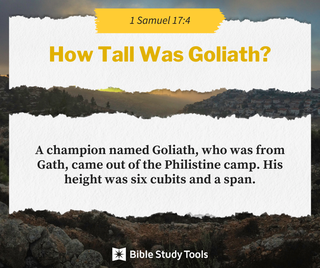
- Recent Translations
- All Translations
Sāmǔĕrjìshàng 17:28
Share
Settings
Images for Sāmǔĕrjìshàng 17:28

Sāmǔĕrjìshàng 17:28 Meaning and Commentary
And Eliab his eldest brother heard when he spake unto the
men
Heard the questions he put to them, by which he perceived his inclination:
and Eliab's anger was kindled against David;
because what he had said carried in it a tacit reproach of him, and others, that they had not the courage, and did not attempt to encounter with the Philistine; or the displeasure he expressed was either out of affection to him, fearing, or being assured almost he would perish in the enterprise; or rather out of envy to him, lest succeeding in so bold an action, he should gain superior glory to him, and the rest of his brethren, who yet was the youngest of them:
and he said, why comest thou down hither?
for though David had talked with his brethren, or had begun to talk with them, yet he had not sufficiently explained the reasons of his coming:
and with whom hast thou left those few sheep in the wilderness?
the wilderness of Judea, or some wilderness near Bethlehem; by this he would not only insinuate a charge of unfaithfulness, in not taking care of his father's flock committed to him; but his view was to make him look little and mean in the eyes of the people, that in the family he belonged to he was thought to be fit for nothing but to keep sheep, and those but a small flock, and in doing this was negligent and careless:
I know thy pride, and the haughtiness of thine heart;
that he was too proud to keep sheep, and wanted to advance himself in the army, and make a figure there, and thereby gratify his vanity and ambition, which was the reverse of David's character; for, such was his humility, that, though he was anointed king, and had been preferred in Saul's court, yet condescended with all readiness to keep his father's sheep; and what he now proposed was not from any bad principle in his heart, but purely for the glory of God, and the honour of the people of Israel, who were both reproached:
for thou art come down that thou mightest see the battle:
out of curiosity, and to take every advantage and opportunity of signalizing and making himself famous.